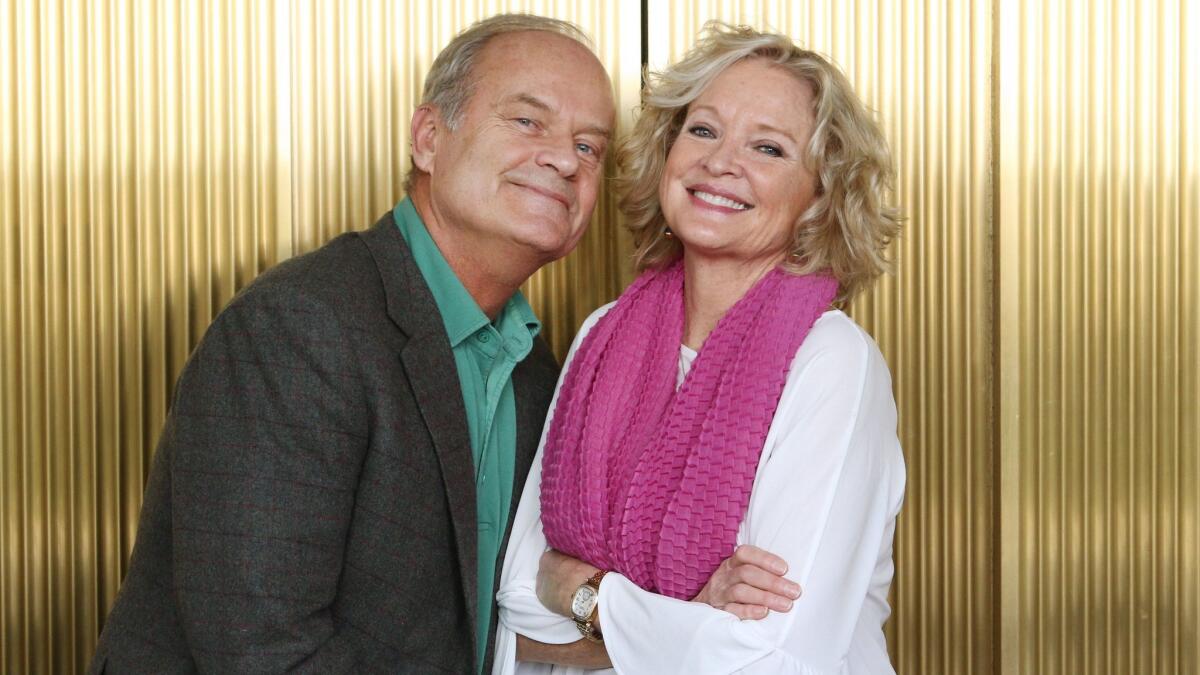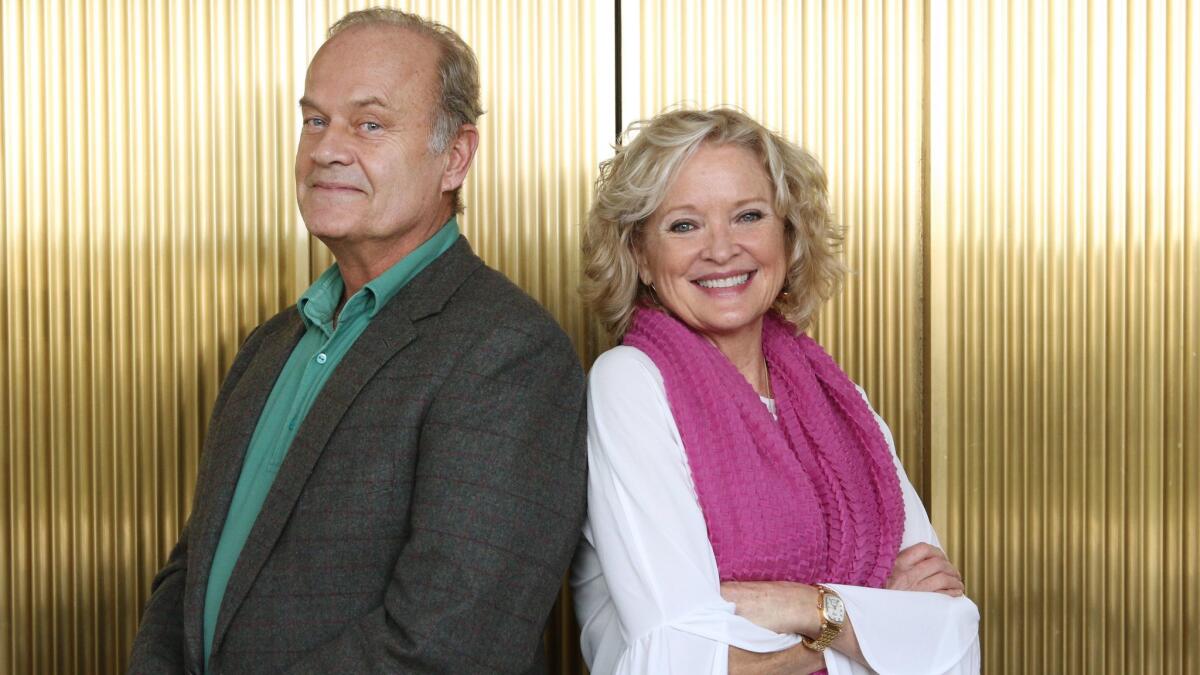Kelsey Grammer and Christine Ebersole take the L.A. Opera stage for ‘Candide’

The line between real life and entertainment can seem increasingly blurry these days, especially for those in Tinseltown who find themselves in traffic alongside the celebrities whose characters — and personal lives — we follow on our screens. But the street signs advertising Los Angeles Opera’s upcoming production of “Candide,” starring Kelsey Grammer and Christine Ebersole and opening Jan. 27, are likely to strike passersby as a little surreal.
It’s true that Grammer’s best-known character, the snooty psychiatrist Dr. Frasier Crane from NBC’s “Cheers” and its long-running spinoff, “Frasier,” was an opera buff — but does that qualify Grammer to sing opera?
Ebersole has won two Tonys, for “42nd Street” and “Grey Gardens,” just starred in “War Paint” on Broadway and is as famous for her pipes. Still, opera is a specialized skill, requiring a lifetime of training and commitment, not something musical-theater stars routinely pop in to try. Are we mixing media here with too free a hand?
Of course, “Candide” is not your standard opera. For most of its existence, whether called an opera, an operetta, a light opera or a musical comedy, has been a source of scholarly contention. The Voltaire novella that inspired it, first published in 1759, defies categorization too.
Written as a satirical attack on Leibniz, whose philosophy of optimism, Voltaire believed, trivialized human suffering, the slim work of comic fiction became a perennially bestseller. Its hero, Candide, is raised by a Leibnizian tutor, Dr. Pangloss, who maintains that our world is “the best of all possible worlds.” After many picaresque, darkly humorous, gleefully described humiliations and tragedies, Candide comes to believe that people must not just accept reality but work to improve it: “We must cultivate our garden.”
The opera premiered in 1956 on Broadway with a score by Leonard Bernstein and a libretto by Lillian Hellman. Although it flopped, the popularity of its music encouraged later artists to give it another whirl.
Hugh Wheeler wrote a new book in 1974 to replace Hellman’s, and it was in turn rewritten by John Caird in 1999, but Bernstein’s score has remained and is considered one of his masterpieces. Along the way numerous directors earned plaudits with their stagings, including the Broadway impresario Harold Prince and the late Gordon Davidson, whose 1966 success with it led to his directorship of the Mark Taper Forum in L.A.
What makes “Candide” so tricky for would-be labelers is the diversity of its musical styles. Although Candide and his love-interest, Cunegonde, require operatic voices, Grammer’s part, Pangloss, and Ebersole’s, known only as the Old Lady, have often been played by other types of singers. Carroll O’Connor (pre-“Archie Bunker”) was Pangloss in Davidson’s production; Linda Lavin, Andrea Martin and Patty LuPone have all played the Old Lady.
The Times caught up with Ebersole and Grammer just before rehearsal at the Dorothy Chandler Pavilion to get the whole story.
So how did you each of you get involved in this production?
Ebersole: I got offered the part! How could I resist?
Grammer: It’s the same story for me. Those are nicer events than the other option — the begging. I got a call from [L.A. Opera general director] Plácido Domingo, and of course, I mean, he’s famously charming, so I’d already decided I was going to roll over for him anyway, and we talked for about two seconds and I said, “Ah, what the heck, I’ll try it.” And then we talked about Barcelona, and he said, “Oh, I must introduce you to the greatest ham in the world.” So I was treated for dinner in Barcelona when I went last spring.
Ebersole: Mine was not as exciting. Mine was a call from my agent: “Are you available?”
Grammer: Fantastic. Those are better calls, though. My last call from my agent was, “You know, there’s not really much going on this year.” My agent! What kind of phone call is that? “Not sure we’re gonna be able to do much for you this year, Kels.” Thanks! Maybe I should be changing agents!
Ebersole: Don’t print that!
Grammer: Well, maybe you should.
Christine, you were doing “War Paint” on Broadway, when you got the offer? And you thought you’d like to come out to L.A. next and perform in an opera?
Ebersole: Yes. I said to my husband today, I can’t recall being as thrilled in anything I’ve ever done as to be here at the L.A. Opera and be participating in “Candide.” I really honestly can’t recall. Because it’s a whole other realm. It’s not musical theater. The sound of these voices is electrifying. It’s stunning, stunning.
There’s no amplification?
Ebersole: There actually is going to be amplification. So imagine that!
Grammer: The language of this is pretty complex and intricate and conversational, so I think they’ve made a wise decision to try to make sure the audience hears it. If we were all speaking Latin, or Italian, what the hell, just [sings sustained operatic note]. Christine also has a magnificent voice. It’s really fun to listen to.
I’ve always been in awe of opera singers, and to be in the midst of them, my jaw’s dropped half the time.
— Christine Ebersole
Christine, this is not your first experience with opera. You played a soubrette in “Amadeus.”
Ebersole: But that was not my voice! See how believable I am as a performer? You thought it was me.
Grammer: Well, see, I auditioned for that. Sadly it didn’t go so well.
Ebersole: Oh, yeah? Well. I was thrilled with that part too. But I mean, again, I’ve always been in awe of opera singers, and to be in the midst of them, my jaw’s dropped half the time. The part of the Old Lady is not considered — they don’t hire people that sing opera for that role.
Grammer: Or for my character.
Ebersole: So it’s nice that we can sneak in!
Grammer: They’ve sort of allowed us in to the higher world. It sort of is like seeing the tall ships sail into the harbor.
Have you seen many productions of “Candide”?
Ebsersole: Never saw it in my life.
Grammer: No, me either.
So how are you approaching your characters?
Grammer (bursting into laughter): They’re sort of stock characters, aren’t they? There’s nothing we’re doing that we haven’t done before.
Ebersole: It’s broad brushstrokes. Primary colors.
Grammer: “Red.”
Ebersole: No shades of gray.
Grammer: If we were 20, we’d be thinking about what we’re trying to do to make the characters believable. but at this point, it’s sort of like water off a duck’s back.
Ebersole: That’s all you got left! What else is there?
Grammer: You know, we actually are good at this. The only thing I worry about is, will they still be listening, 45 minutes in? I’m barely awake. And I’m talking! But no, I think it’s going to move pretty well. The staging is really inventive and creative, sort of avant-gardey in a way. It’s really fun.

Did you two know each other well before this?
Grammer: No. We did something, though?
Ebersole: We never worked together. We met when you were doing “La Cage.” And it turns out we shared the same dresser, at different times. Laura. She was my dresser for “War Paint” and your dresser for “Finding Neverland.”
Grammer: Laura! We had a good time. She’s a tough bird!
Ebersole: Tough!
Grammer: She could play your part! One buttock!
Right, the Old Lady has lost a buttock during the course of her adventures.
Ebersole: Yes, and she survived!
Did either of you read “Candide” in high school?
Ebersole: I just recently read it. I think it’s helpful just to get the scope of it. It’s a little book. Not long. Easy read.
Grammer: Oh, really? What else did he write, Voltaire?
Ebersole: I don’t know. I skipped school that day.
What’s it like being back in L.A., Christine?
Ebersole: I lived here for 14 years. Now I live in Maplewood, N.J.
I read that you left Hollywood because somebody told you when you were approaching 40 that you were over the hill.
Ebersole: Actually they said 35. If you don’t make it by 35, that’s it.
So you went back East and became the toast of Broadway in “Grey Gardens.” But what it’s like to be back here playing the Old Lady?
Ebersole: It’s ironic. Actually, I was playing a part in “Ally McBeal” where my character is referred to as “that old woman,” and I said, “I’ve got to get out of here.” Twenty years ago.
Grammer: That’s funny. You still haven’t made the grade yet. You’re just pretending to be old.
Ebersole: But that’s the irony of it! That’s what got me out, and that’s what brought me back. The old ladies!
Grammer: This one’s a riot.
Ebserole: I’m having fun. It’s a chance to play.
What do you think of the director, Francesca Zambello?
Ebersole: We haven’t met her yet. The associate director and the choreographer are putting us in. The show has been done before. They did it at Glimmerglass [in Cooperstown, N.Y.]. So it’s been set up. They’ve done it in Europe.
Grammer: This is about the fifth iteration. This is what they do with these operas. Saves us a lot of the hard work, actually.
Ebersole: Oh, it does! “Move here.”
Grammer: “You just go over here and then you sit there and then you come down here.” Thank you.
Ebersole: Point me in the direction!
Is it hard to memorize ...
Grammer: Yes.
Ebersole: Well, for him, yeah.
You have a lot of lines?
Grammer: Arguably it’s not the greatest language. There’s some stuff that’s funny. You can kind of make it funny. And it’s fine. It’s hard to get in the head, though. Which for me is usually a mark that it’s maybe not the best language. Oh God, I don’t want to hurt anybody’s feelings.
Lillian Hellman isn’t around anymore.
Grammer: I knew Lillian Hellman! I escorted her to dinner years ago. Lovely gal. I was working with Tammy Grimes. “A Month in the Country.” With her daughter, Amanda Plummer. And then she invited me to dinner, and she said, “I’m going to call Ms. Hellman.” So I picked her up. Carried her up the stairs. Five-floor walk-up. I was young, 23.
You literally carried her up the stairs?
Grammer: I literally carried her up. “I don’t want to go up those stairs.” “I’ll carry you.” You know that Blackglama mink she had? It was a very cool and freaky, wonderful experience.
Ebersole: You carried her and the mink?
Grammer: And the mink! The whole thing, right up the stairs. And the cigarette. Different era.
Kelsey, although you’ve never performed in an opera, the character you play on “The Simpsons,” Sideshow Bob, certainly has. He has a beautiful voice.
Grammer: He does, that Sideshow Bob! I won an Emmy for Sideshow Bob, for the episode “The Italian Bob,” in which he sings at La Scala.
Have you both been singing all your lives?
Grammer: I didn’t formally do it until I was about 14.
Ebersole: I have a recording that my father made of me singing “Jingle Bells” at the age of 3, and it was completely on pitch. It’s a gift from God.
Grammer: And she’s still on pitch. I sing a little flat.
Ebersole: No, you don’t.
I honestly think the message is, Hang in there. Fight the good fight. Don’t quit. Keep going.
— Kelsey Grammer
What does the future hold? What are you looking forward to doing after this?
Ebersole: Brünnhilde in Wagner’s Ring Cycle.
Grammer: You’d have to put on a little weight. I’d pay to see that! I’m hoping to do “Big Fish” again in London — a West End run, because that was a really beautiful experience. And I have some other projects. More singing? Maybe.
What do you think “Candide” has to tell us in this day and age?
Grammer: Well, the persecution stuff, I guess maybe you can try to lay a political overtone on that. I honestly think the message is, “Hang in there. Fight the good fight. Don’t quit. Keep going. It is the best of all possible worlds because it’s the one you’ve got. And it’s always going to be full of challenges and travails and injustices and dilemmas and things that seem impossible, and yet you survive. And if you’re blessed enough to survive, you’ve had a hell of an opportunity.” I think it’s a really positive message.
Ebersole: I’m with him.
[A soprano begins to sing scales backstage.]
It’s time for rehearsal! Christine, I’ve read you don’t usually warm up before you perform?
Ebersole: No. As Ethel Merman said, “What do you think the first number’s for?”
♦ ♦ ♦ ♦ ♦ ♦ ♦ ♦ ♦ ♦
‘Candide’
Where: Dorothy Chandler Pavilion, 135 N. Grand Ave., Los Angeles
When: 7:30 p.m. Jan. 27, 7:30 p.m. Feb. 3, 7:30 p.m. Feb. 8; 2 p.m. Feb. 11, 7:30 p.m. Feb. 15, 2 p.m. Feb. 18
Tickets: $18-$324
Info: (213) 972-8001 or laopera.org
SIGN UP for the free Essential Arts & Culture newsletter »
See all of our latest arts news and reviews at latimes.com/arts.
More to Read
The biggest entertainment stories
Get our big stories about Hollywood, film, television, music, arts, culture and more right in your inbox as soon as they publish.
You may occasionally receive promotional content from the Los Angeles Times.










